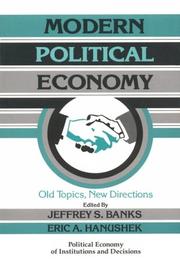| Listing 1 - 3 of 3 |
Sort by
|

ISBN: 0521478103 0521472334 0511625723 9780521478106 9780521472333 Year: 1995 Publisher: Cambridge : Cambridge University Press,
Abstract | Keywords | Export | Availability | Bookmark
 Loading...
Loading...Choose an application
- Reference Manager
- EndNote
- RefWorks (Direct export to RefWorks)
Political economy has been an essential realm of inquiry and has attracted myriad intellectual adherents for much of the period of modern scholarship. The discipline's formal split into the distinct studies of political science and economics in the nineteenth-century, while advantageous for certain scientific developments, has biased the way economists and political scientists think about many issues, and has placed artificial constraints on the study of many important social issues. This volume calls for a reaffirmation of the importance of the unified study of political economy, and explores the frontiers of the interaction between politics and markets. This volume brings together intellectual leaders of various areas, drawing upon state-of-the-art theoretical and empirical analysis from each of the underlying disciplines. Each chapter, while beginning with a survey of existing work, focuses on profitable lines of inquiry for future developments. Particular attention is devoted to fields of active current development.
Economics. --- Political science. --- 338.22 --- AA / International- internationaal --- 331.31 --- 333.846.0 --- Economische organisatieleer. Economisch beleid. Economische politiek --- Economisch beleid. --- Verband tussen het monetair, bank- en kredietbeleid en de economische ontwikkeling: algemeenheden. --- 338.22 Economische organisatieleer. Economisch beleid. Economische politiek --- Economics --- Political science --- Administration --- Civil government --- Commonwealth, The --- Government --- Political theory --- Political thought --- Politics --- Science, Political --- Social sciences --- State, The --- Economic theory --- Political economy --- Economic man --- Economisch beleid --- Verband tussen het monetair, bank- en kredietbeleid en de economische ontwikkeling: algemeenheden --- Social Sciences --- Political Science
Article
Year: 2013 Publisher: Paris : OECD Publishing,
Abstract | Keywords | Export | Availability | Bookmark
 Loading...
Loading...Choose an application
- Reference Manager
- EndNote
- RefWorks (Direct export to RefWorks)
Existing estimates of the labor-market returns to human capital give a distorted picture of the role of skills across different economies. International comparisons of earnings analyses rely almost exclusively on school attainment measures of human capital, and evidence incorporating direct measures of cognitive skills is mostly restricted to early-career workers in the United States. Analysis of the new PIAAC survey of adult skills over the full lifecycle in 22 countries shows that the focus on early-career earnings leads to underestimating the lifetime returns to skills by about one quarter. On average, a one-standard-deviation increase in numeracy skills is associated with an 18 percent wage increase among prime-age workers. But this masks considerable heterogeneity across countries. Eight countries, including all Nordic countries, have returns between 12 and 15 percent, while six are above 21 percent with the largest return being 28 percent in the United States. Estimates are remarkably robust to different earnings and skill measures, additional controls, and various subgroups. Intriguingly, returns to skills are systematically lower in countries with higher union density, stricter employment protection, and larger public-sector shares.
Book

ISBN: 9264234837 9264234810 9789264234833 Year: 2015 Publisher: Paris : OECD Publishing,
Abstract | Keywords | Export | Availability | Bookmark
 Loading...
Loading...Choose an application
- Reference Manager
- EndNote
- RefWorks (Direct export to RefWorks)
While access to schooling has expanded around the world, many countries have not realised the hoped-for improvements in economic and social well-being. Access to education by itself is an incomplete goal for development; many students leave the education system without basic proficiency in literacy and numeracy. As the world coalesces around new sustainable development targets towards 2030, the focus in education is shifting towards access and quality. Using projections based on data from the OECD Programme for International Student Assessment (PISA) and other international student assessments, this report offers a glimpse of the stunning economic and social benefits that all countries, regardless of their national wealth, stand to gain if they ensure that every child not only has access to education but, through that education, acquires at least the baseline level of skills needed to participate fully in society.
Education --- Education and state --- Economic development --- Education, Special Topics --- Social Sciences --- Effect of education on --- Development, Economic --- Economic growth --- Growth, Economic --- Education policy --- Educational policy --- State and education --- Government policy --- Economic policy --- Economics --- Statics and dynamics (Social sciences) --- Development economics --- Resource curse --- Social policy --- Endowment of research --- PL / Poland - Polen - Pologne --- 338.012 --- 338.753.0 --- Energie (productiefactor). --- Energie: algemeenheden. --- Energy policy --- Politique énergétique --- Energie (productiefactor) --- Energie: algemeenheden
| Listing 1 - 3 of 3 |
Sort by
|

 Search
Search Feedback
Feedback About
About Help
Help News
News